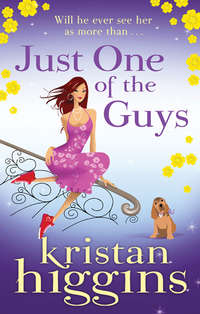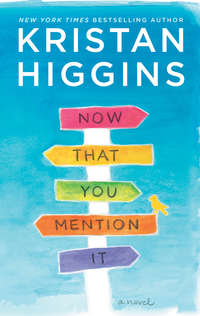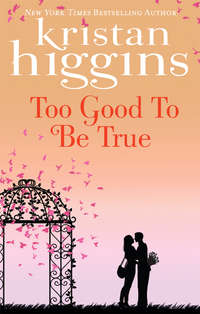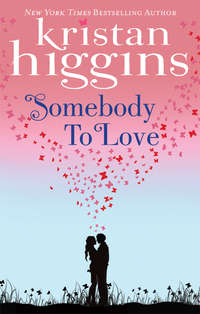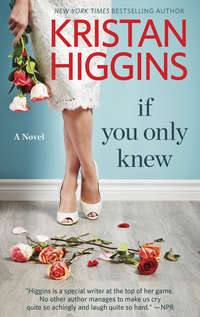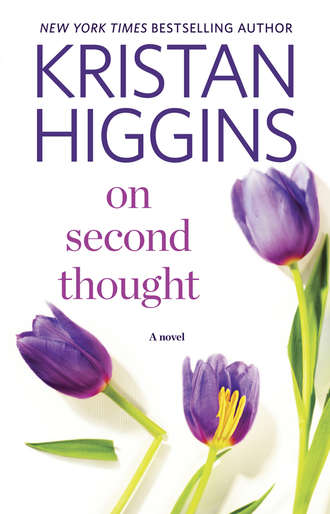
Полная версия
On Second Thought
Eloise put her arm around her and ushered her away. I wondered if I said that selfish whore bit aloud.
“Thank you for coming,” I said belatedly, my voice sounding cheerful, as if I were waving fondly as best friends left after dinner.
Cause of death: blunt trauma to the head.
If my sister had gone for wood counters, or soapstone, would Nathan still be alive?
Apparently, he had a tiny little oddity in one of the blood vessels in his brain. Not a problem, unless one’s wife needed a second glass of wine.
Cause of death: wife wanted to have buzz on during irritating speech by sister’s boyfriend.
Couldn’t Eric just have asked Ainsley to marry him in private, like a normal person, I don’t know, like maybe five years ago? Instead, he had to make a big production in front of everyone, in front of his Wellness Montage (it had been labeled, and really, who the hell photographs the removal of a testicle?). No, we all had to drink a toast to my little sister, and boom, I’m a fucking widow.
I looked at the line, which went out the door, out into the foyer and down the street. When we pulled up to the funeral home, the line of mourners was four people thick and wrapped around the block. So much black it looked like the Night’s Watch from Game of Thrones had descended. That was two hours ago, and the line showed no sign of thinning.
Everyone loved him.
Nine months ago, I hadn’t. Nine months ago, I hadn’t known him. I’d finally gotten to that happy Zen place, and life had been really, really good.
If he had tripped nine months ago, I wouldn’t have even known about it. Seven months ago, I would’ve lost a very sweet guy I’d been seeing. I would’ve been melancholy for a while. Would’ve made a black joke about how the universe was telling me not to date. Five months ago, I would’ve mourned him, would’ve wondered if we had truly been in love or if it was just infatuation. I would’ve gone to his wake and introduced myself to his mother as a friend, smiled sadly when I thought of him.
Four months ago, I would’ve lost my fiancé, but I still wouldn’t have known the reality of living with him day after day.
Ninety-six days of marriage.
I drifted over to the casket and, for the first time this endless evening, took a long look at my husband’s body.
That woman had been wrong. He looked absolutely dead. His face was hard and stiff, like one of those plastic surgery addicts, pumped up on filler. I wondered if the funeral home used the same stuff. Juvaderm. Botox.
Oh, Nathan.
At least his hair felt the same. My fingers stroked it, gently, trying not to make contact with his scalp. Just his hair, soft, silky hair that curled a little when he was sweaty. Roman emperor hair, I said once. We were in bed at the time. His smile...
“Hey.”
It was Eric. Cause of death: extremely long-winded speech.
“Hey,” I bit out.
“You doing okay?”
“Not really.”
He put his arm around me, and I felt a pang of regret. Eric had always been a decent guy, if self-absorbed. “I was telling Sean about how weird this was, given my cancer. Like there’s some meaning here.”
The irritation came swooping back like a vengeful eagle. “There’s not, so please. None of your platitudes, Eric.”
He blinked. “I...I just meant life is short. You have to live life large.”
“Not now, Eric.”
“It’s almost a message from the universe. You know I loved him, too. And I thought I’d be the one who died. You know? From my cancer?”
“I vaguely remember, yes.”
“It’s just so random. When I was getting chemo, there were days when I thought this was the end, and I said to myself—”
“Here, Kate.” My sister pressed a glass of water into my hand. “Mrs. Coburn wants you to meet someone. Nathan’s friend from Columbia.”
Saved by the mourners. My sister steered Eric away, and I took another long look at my husband.
I love you, I thought desperately, and at almost the exact same time, another thought came, hard and defiantly ugly.
I wish we’d never met.
Chapter Seven
Ainsley
“Just when I’d accepted the divorce,” Candy liked to tell people on book tour, “Phil showed up with his child.”
I remembered thinking at age three and a half that it would be fun to live with a lady named Candy, that her house would be sparkly and we’d eat mostly pink foods. There’d be a lot of singing, I imagined.
There wasn’t. Candy sighed a lot. She had a daily headache.
Hence, my childhood of guilt. Candy would buckle me briskly into a car seat, then wince as she stood up, hands on her back. She was in her forties when I came to live with her, and she’d tell her friends that she’d forgotten just how hard little kids were. She was dutiful, showing up at parent-teacher conferences because Dad was off with the boys of summer. She made sure I ate nutritious—and tasteless—dinners, but it was pretty clear. I was not her daughter. She already had one of those.
When I came along, Candy had been working on her PhD. It took her four more years to finish her dissertation, which became her most famous book—Stuck with You: Raising the Recalcitrant Stepchild. It took me decades to figure out it was about me.
Unlike Sean and Kate, I was a day-care kid. From their stories, it seemed they were raised in a magical kingdom of sibling friendship and parental delight. Candy baked back then, coconut cookies and angel food cake. Kate and Sean had stories of the time their mother made a tepee in the living room over winter break, or read The Wind in the Willows out loud, doing all the voices to perfection. Sean and Kate even shared a room until he turned seven.
There were dozens of pictures of them before I came along, laughing together, arms slung around each other, Sean steadying Kate on her bike, the two of them eating Popsicles on a summer day, or standing in front of the house on the first day of school, Kate’s hair in neat ponytails, Sean’s freshly cut.
Day care was fine. To the best of my knowledge, I was never dropped on my head or burned with cigarettes or put in toddler fight club. When I started kindergarten at the age of four and a half, I went to after-school programs, envious of the kids who got to ride the bus home.
As I got older, Candy signed me up for pretty much anything that kept me out of the house. I was a Daisy/Brownie/Girl Scout, played soccer from the age of five, was forced into volunteering at Adopt-a-Grandparent, spending many a high school afternoon talking to elderly people who kept asking me to take them home.
My father liked me quite a bit, though he wasn’t around too much, always flying off somewhere to do his umpire thing. But when he was home, life was a lot happier. “I’m taking the Ainsburger on some errands,” he’d call to Family 1.0, and once or twice a month he would take me off, my little hand so happy in his. We’d visit one of his friends, and I’d get to have ice cream and watch TV, maybe play computer games, something Candy forbid. Dad and his friend would go into the bedroom to “have a little talk in private,” and hey, I didn’t care. Dad often took me to the toy store for a new stuffed animal after the visit. For years, I thought errands meant visiting ladies.
Kate and Sean were fine. They didn’t hate me, beat me, tease me. They just kind of...ignored me. Not in a mean way, but in a slightly confused way. I remember knocking on Sean’s door, asking him if he’d play with me. He looked utterly baffled as he groped around in his desk for something I could do with him. (He showed me how to shoot an elastic band, then told me he had to study.) Kate wasn’t the type to brush my hair or play dolls with me, though she would, if I asked.
I just got a little tired of asking.
So instead, I made up friends. Lolly and Mr. Brewster, the tiny humans who lived in the mountains of my blankets, would ski and slide down the hills made by my knees and have terrible crashes and vivid arguments about whose fault it was. There was Igor, a tiny elephant who lived in shoe boxes I decorated with scraps of fabric and paint.
I sound tragic, don’t I? I wasn’t, I’m pretty sure. By the time I was eight or nine, I had friends, and it was such a relief, having people who really seemed to like talking to me. In middle school, I joined everything, did the grunt-work jobs (always secretary, never president, equipment manager rather than star player). High school was the same; I was always Switzerland, staying friends with everyone, never taking sides.
I didn’t have a boyfriend. But I was great at giving advice to my friends who did have boyfriends, and I got a vicarious thrill every once in a while, approaching Seth to tell him that Lucy really liked him, and did he like her?
When Kate went off to NYU, my parents and I moved to Cambry-on-Hudson, and I made the most out of being the new girl. I’d learned long ago that being a superfriend was the way to make people like me back. Adore, and ye shall be adored.
Sean went from Harvard to Columbia Medical School, because he was a show-off. After NYU, Kate got an MFA in photography from Savannah College of Art and Design and immediately started working as a professional photographer. She was dazzling to me, so sophisticated and urbane, living in Brooklyn (I barely knew where that was back then, but it sounded so cool).
I went to a pretty nice college in New York City—well, it was Wagner College on Staten Island, in the shadow of the mighty skyline but technically still in New York City.
Unlike my siblings, I wasn’t driven to achieve or study anything in particular. College was wonderful, and I loved being away from home. My siblings were off leading their fabulous, very adult lives; Sean married Kiara, also a surgeon, specialized in some kind of brain surgery and did the occasional TED Talk. Kate lived in her brownstone, a world away, it seemed, though she had me over for dinner once in a while, always nice but a little unsure where I was concerned.
Then, junior year, I met Eric.
Wagner was a small school, but somehow, we didn’t know each other. He was an accounting major; I was studying philosophy, because doesn’t the world need more philosophers?
I saw Eric as we were moving back in on the first day of the new school year. His parents were saying goodbye, hugging him, and his mom was laughing and wiping tears. He kissed her on the cheek, hugged his dad, not the awkward thanks, gotta run hug of most boys our age, but a real hug, a loving hug.
And Eric was handsome. Dark hair, dark eyes, attractively dorky glasses, lanky build.
He looked up, saw me watching and smiled, and that was it. I fell in love.
It took two weeks for me to speak to him, which was getting awkward, since we lived in the same dorm that year. But one happy night, my key card wasn’t working, and I was patiently reinserting it for the fifteenth time when Eric came up behind me and said, “Want me to try, girl who doesn’t talk to me?”
I blushed.
He smiled. “Maybe we could grab a coffee,” he suggested, and my heart ricocheted around my chest.
We grabbed a coffee.
By the weekend, we were a couple. It took him all of two weeks to get me into bed; basically, the amount of time it took for the Pill to kick in. I couldn’t believe love had finally found me in the form of affable, well-liked, dorktastic Eric Fisher...my boyfriend!
And even more remarkable...he felt the same way about me.
We could talk all night. It was more important to talk than sleep. He was funny, and he was so nice that it took my breath away. I hadn’t met any boys like that. Boys who held the door and bought you cold medicine when you were sick and snagged a blueberry muffin from the dining hall just because you loved them.
With Eric, I finally belonged. Finally, I was special.
That summer, we both got internships in Manhattan, me with a tiny publishing house, him with a bank. His parents let us stay in their apartment on 102nd Street—the building was named The Broadmoor, which I thought was so sophisticated. I’d never lived in a building with a name before. The apartment had belonged to Eric’s maternal grandmother, and it was a tiny, unglamorous place with a bedroom so small it could fit only a double bed. The living room was also the kitchen, and our table could fit only two people, and even then, our knees had to touch.
Mr. and Mrs. Fisher approved of me, which in itself was dazzling. “Are you religious, sweetheart?” his mom had asked on our third dinner together.
“Not really, Mrs. Fisher. Don’t let the name O’Leary fool you,” I said. “I can’t remember the last time we went to church. Maybe when my cousin got married a few years ago?”
She beamed. “Call me Judy, honey.”
“Sorry about my mom,” Eric said, smiling at his mother. “She wants to make sure the kids will be raised Jewish.”
Kids! Raised! My knees thrilled with adrenaline and love.
After graduation, we stayed together. It was always we. “We should go to San Francisco,” Eric said late in our senior year, “though it would kill my mother. By the way, she wants to take you to Phantom again. I’m sorry.”
I adored him. He was smart, kind and thoughtful. He told great stories, making his happy, normal childhood seem utterly hilarious without ever mocking his parents. His devotion to me didn’t even flicker. That was another thing I loved about him. His constancy.
The difference between being someone’s friend, sister (or half sister, as the case was), daughter (or stepdaughter)...and being someone’s love was breathtaking. I felt like the most wonderful creature in the world.
Upon graduation, Eric and I got jobs in the city, making Judy just about cartwheel with joy (they lived in nearby Greenwich, Connecticut). My B+ average and philosophy major qualified me to be nothing, but I got a job as a receptionist at NBC. Eric got a position at the bank where he’d interned, and we moved back into The Broadmoor, much to the jealousy of our friends, who had to endure complicated commutes from Queens or Yonkers.
It was perfect. The thrill of our first real jobs, riding on the subway, getting pad Thai for dinner and watching TV, fooling around in our tiny bedroom...it was everything I imagined adult life should be.
I loved working at Rockefeller Center, liked seeing the celebrities going in and out. I liked dressing up for work in my retro-cute dresses or sweater sets and A-line skirts. I was outgoing, I was cheerful, I said hello but didn’t ask for a selfie with the talent or try to kiss up to the producers and writers (though I did text Eric every time I saw Tina Fey). The job wasn’t rocket science, but I did it well.
Eric had a higher-paying job, and I encouraged him to look into MBA programs, because he had a really good brain for numbers. After just two months at the bank, he was already restless and irritable about his entry-level position. He wanted something with status, with an office and a personal assistant.
Personally, I felt there was a lot of peace in doing a not-hard job. Besides, my real adult life lay ahead of me, in some happy, vague fantasy that involved me wearing a lot of Armani, but still being a stay-at-home mom to our kids. Surely Eric and I would be getting married soon; we talked about it without reservation, not the specifics, but just when we’re married or that would be a nice place to settle down or when we have a baby. There was no rush. We were just out of college, after all.
NBC was fine. I never minded delivering lunch to the newsroom or standing in the rain to grab a taxi for someone who’d forgotten to book the car service. Then one day, a reporter from The Day’s News asked me to run out and buy him a new shirt and tie; he had to go on air unexpectedly and had sweated through his original shirt running back from lunch. “I hate to ask you,” he said. “But I’m in a jam, and my assistant isn’t in today.”
“Oh, I don’t mind!” I said. “No problem at all.”
He gave me four hundred dollars. “Buy yourself something for your trouble,” he said, “and thank you. Really, Ainsley. I appreciate it.”
How nice that he knew my name! Well, I wore a name badge, but most people just called me “Hey,” as in “Hey, I need a cab/lunch/reservation...”
I went to Brooks Brothers, got him a blue shirt that would bring out his nice eyes and a cool blue-and-purple tie with a pattern that wouldn’t strobe on TV. I brought the stuff up to the office and left the receipt and change in an envelope on his desk.
Two days later, there was a beautifully wrapped box on my desk. I told you to buy yourself something nice, the note said. Thank you again. —Ryan Roberts. Inside was a stunning pink-and-red silk scarf, so fine it practically floated. As Candy had drilled into me, I handwrote him a thank-you note.
Three weeks later, Ryan asked if I wanted to work on The Day’s News as a production assistant. There was an opening, and he’d thought of me. Eric just about fainted when I told him. “That’s great! Honey, I’m so proud of you!”
So even though I had only a vague idea of what a production assistant did, I said yes.
And here’s a secret. If you didn’t mind doing anything anyone asked, you were an amazing production assistant. Make coffee, get lunch, proofread this copy, get the art department to change this graphic, cut this story down to three minutes, call this restaurant and make a reservation for this anchor...it was easy. Other production assistants ran around sweating and panicked, trying to outsweat and outpanic each other to show how very important they were. I didn’t. I knew I wasn’t.
That was the thing that really stood out at NBC—my complete lack of ambition. I didn’t want to be a journalist or an on-air reporter. I didn’t want to go to Beirut (are you even kidding me?). Let other people go to dangerous places filled with bombs and rubble and gunfire. Me, I liked running water and flirting with the seventy-five-year-old doorman at The Broadmoor. I liked sleeping with Eric, because even though we both worked long days, we still fell asleep cuddled together every night.
I didn’t want a corner office. I never asked for a raise or a promotion.
This somehow got me a raise and a promotion every six months. For some reason, Ryan thought I was invaluable.
I know what you’re thinking. That he put the moves on me. Nope. He took Eric and me out to dinner with his wife. He showed me pictures of his kids, whom he truly adored. He thanked me for remembering his mom’s birthday when he forgot.
I went from production assistant to assistant producer, making my colleagues grind their teeth. Six months later, Ryan was tapped for more airtime, and I got another promotion so I could go along with him (associate producer). A year and a half after that, he was made lead anchor of The Day’s News, and at the age of twenty-six, I was made senior producer of the country’s second-largest news show.
Eric was so proud. He took both the O’Leary and Fisher families out to celebrate at a superfancy restaurant, and everyone came, even Dad, who happened to be in town for a Yankees-Orioles series. Judy and Aaron continually toasted and praised me, and Kate asked for celebrity gossip. Even Sean was impressed. Candy wondered how I was qualified, and Eric said, “Because she’s wonderful at everything she does.”
Ryan’s popularity soared; he was young enough to still have boy-next-door good looks, old enough for a sense of gravitas. He had a great sense of humor (hosted Saturday Night Live, in fact; I got Judy and Aaron tickets) and was adored by everyone at NBC. He treated me like an equal, listened to my suggestions and took them.
When he interviewed the President, I told Ryan to ask about the day his kids were born, and sure enough, the leader of the free world teared up, and ratings and social media went wild. Ryan knuckle-bumped me after the interview and introduced me to the President. Of the United States.
Meanwhile, Eric graduated from Rutgers with his MBA, got a job on Wall Street, and we were living the Big Apple dream. We traded in The Broadmoor for a two-bedroom in Chelsea (no name for the building, alas).
Despite my shiny title and brushes with the rich and famous, I made only a fraction of what Eric did at his job. Unlike me, he was very ambitious. But he was also fretful about work. On Wall Street, in a job with three hundred other bright, ambitious people, it was hard to stand out.
So I jumped in, his secret weapon. I had him invite his boss over for dinner, where I cooked and charmed with work stories and befriended the boss’s wife. I urged Eric to join the company softball team and volunteer for the American Lung Association stair climb in his building. When the CEO had twins, I had Eric make a donation to Save the Children in honor of the newborn boys. (She came down from the top floor to personally thank Eric, by the way.)
Ryan liked to say I had my finger on the pulse of humanity—yeah, yeah, a little over the top—but I did read people well. Eric...not as much. He was a little too used to being the worshipped only child to see what other people needed. I was the opposite. Unworshipped and clear-eyed.
Every so often when we passed a jewelry store window, Eric would look at me and grin. I’d feign innocence, and he’d say, “Just trying to see what you’re looking at.” So there were assurances and hints and references to us getting engaged...but still no ring.
One night, when we were having a rare dinner together in our beautiful apartment, and were both happy and full of good wine, I heard myself ask, “Hon? When do you think we’ll get married?”
He put down his fork; he’d cooked shrimp risotto, my favorite. Nodded, and gazed at me with his kind eyes. “I want that, too. You know I do. I love you so much, Ains. But the last thing I want to do is start our married life at a time when I’m so busy that I can’t spend time with my wife. Another year and a half, maybe two, and I’ll be over the hump. Can you hang in there that long?”
And not wanting to sound like a dependent, weak female, I said, “Of course! I’m busy, too, definitely. No, it was just a... I just wondered.”
“Obviously, we’re gonna get married, babe. You’re the love of my life.” He smiled, poured me more wine, and we had a lovely night. With great sex, I might add.
And then...well...then the shit hit the Peacock, as it were.
In addition to being the country’s most trusted source for news, Ryan Roberts also seemed to be a bit of a magnet for the action.
There was the time a bullet whizzed past his head during a hostage situation, and Ryan had the cameraman shoot him giving the update live, pointing to the hole in the building behind him. How about the time his car was lifted right off the ground in Tornado Alley? The fire in Queens, the terrorist threat in California. Exciting, terrifying stuff, right? I’d write the lead-in: This evening on The Day’s News—Ryan Roberts on the DC hostage situation, too close for comfort. Tune in at five!
At first, I didn’t know anything was amiss. I thought he just wasn’t that good at remembering the details when he called in. I was just down the street from the gunfire, he told me on the phone, but in our news meeting, it was a lot more dramatic—bullets streaking past my head. The big explosion that rattled the windows in the building down the street became a hair-singeing brush with a fireball.
Details can come back to people. It happens all the time. Besides, I trusted Ryan. He was the best boss in the world.
But it became a pattern. His SUV was fired on in Afghanistan. In Botswana, he held a dying AIDS patient in his arms. The news story—and ratings—were so much better, so much juicier when Ryan was part of the news, not just reporting it. And he was on the scene, after all. It was his job.
It didn’t happen all the time. Maybe every few months, but enough that my antenna started to twitch. I finally asked him about it over a late dinner in his office one night. It was hours after a hurricane had socked Brooklyn, and Ryan had been on the scene. “There I was, just trying to get a feel for the area,” he said, “and this woman called out from the subway. She was drowning, Ains! I ran down the stairs, into the water, which was completely filthy, by the way, and dragged her out. She was barely conscious.”






